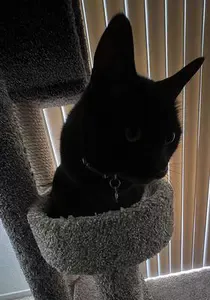15 year old neutered male cat spraying, urine has no smell
by Diane
(Ontario, Canada)
I took in a 15 year old, neutered male cat two years ago. He has begun spraying in 2 or 3 locations.
I quickly clean it up, but there is no smell to the urine. It is hard to find the locations
unless we catch him in the act. He still uses a litter box and appears very healthy.
My thoughts: Thank you for taking in a senior cat, as they are often neglected. I'm sorry to hear that he's having problems.
A black light can help you find the areas where he has sprayed/urinated. You can buy one at many pet stores, online or off, or on Amazon.
When neutered cats spray, there is much less odor than their intact counterparts, but weak urine (little to no odor and light in color) may indicate a health problem. This is particularly true of an older cat, and especially important to note if your cat has not had recent blood tests.
Whenever a cat does something out of character, such as suddenly begin spraying where they never did that before, a good question to ask yourself is...
Why is my cat anxious? Why does my cat feel threatened? What has disrupted his world? Sometimes it's nothing we can detect, but other times, there is a cause. And that brings me to...
A behavior change (he is now spraying) can also indicate a health problem. While he may appear healthy, it's possible he may be spraying because he's not feeling right.
He can't walk up to you and say, "Hey, I'm not feeling so good. I think I need a doctor." So, he sprays. In addition, no odor to the urine may signify he has weak urine, and weak urine can be a sign of a problem.
Since the volume of urine when he sprays is much less than when he urinates, you'll want to check his urine when he uses the box. The litter box is one of the best tools
Have you noticed an increase in your cat's drinking and urinating frequency? If you could observe him when he's using the box, that might be a clue. See if he's urinating more frequently, his urine appears lighter in color, and has less odor than normal.
If so, there are some common conditions that affect older cats that can cause weak urine, increased thirst, and urination. Hyperthryoidism, diabetes, and kidney disease are all possibilities here.
Has he lost any weight recently? That would be further indication of a problem. Left untreated, any of these diseases can turn into a serious problem, so I'd have a vet take a look.
Older cats can also develop dementia, which can manifest in any number of behavioral oddities.
If he's healthy, then I'd look at behavioral causes. By spraying, he's trying to hold on to his territory. He may feel threatened by something. What is challenging him?
Did anything change in the household just before this started? Cats hate change, and sometimes a (seemingly) harmless change can throw a cat off track. A change in work schedules, household members, or even moving the furniture can cause upset.
Are there animals outside that are hanging around and marking their territory outside his house? If so, he may be spraying in response to them. The only way to address that is to remove the threat and the odors they've left behind (get out that black light).
Is he having disputes with other cats or pets in the house? When multiple pets live together, they sometimes have a hard time time-sharing the furniture, litter boxes, food bowls, and various spaces. Ensure that he has enough resources, such as space (vertical and horizontal), hiding places, and litter boxes.
It may help to try Feliway, Rescue Remedy, or some of Jackson Galaxy's products in an effort to ease his mind.
I hope that helps and please keep us updated,
-Kurt

